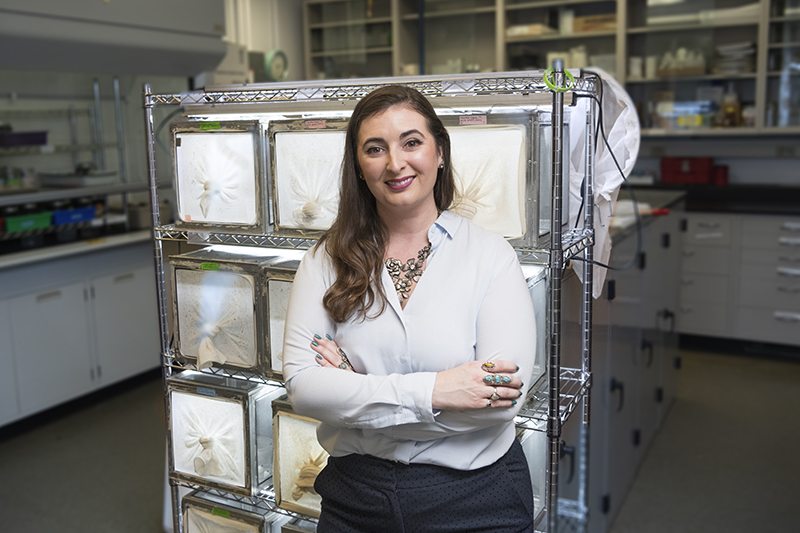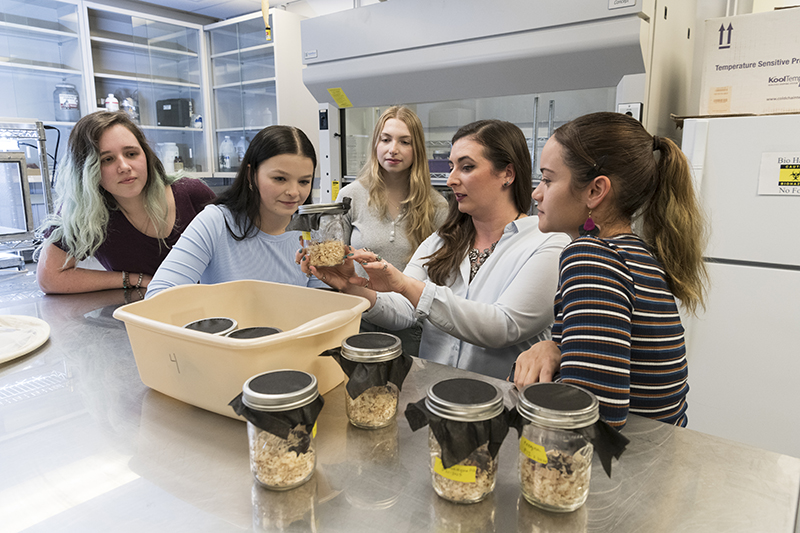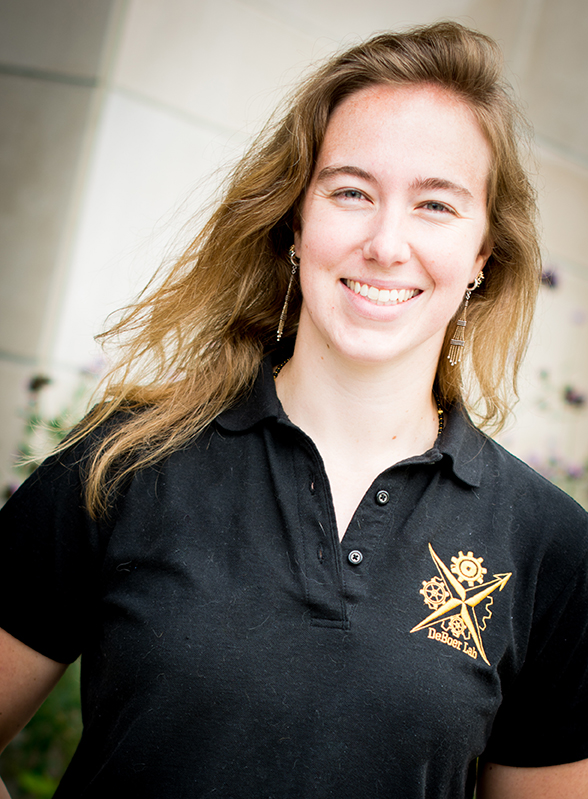March 20, 2023
‘Purdue Pursuits’: Societal Impact Fellows and Scholarship of Engagement Fellows programs

Krystal Hans, assistant professor of forensic entomology and director of forensic science, took part in the Office of Engagement's Societal Impact Fellows Program. (Purdue University photo/John Underwood)
The Office of Engagement offers multiple ways for Purdue faculty and staff to use their work to foster and enhance connections with community partners, pursue research grant funding and take their careers to the next level.
Opportunities like the Societal Impact Fellows and Scholarship of Engagement Fellows programs are helping Krystal Hans and Jennifer DeBoer do just that. Read about their stories and how to participate. Applications are due April 14.
Societal Impact Fellows Program
As the sole forensic entomologist in the College of Agriculture’s Department of Entomology, Krystal Hans, assistant professor of forensic entomology and director of forensic science, is always searching for opportunities to meet new people and expand her network of collaborators.
When Hans isn’t working in her research lab, she’s teaching courses like ENTM 22810, an undergraduate forensic investigation class that dives into cold cases of the missing and murdered. Hans implements assignments and projects that challenge students in the 170-seat class to gather information about the victims in these cases – not the killers. Her goal is to help families, advocates and law enforcement agencies maintain public interest in the cases.
About 'Purdue Pursuits'
A variety of programs, workshops, fellowships and trainings are offered to Purdue faculty and staff each semester. How can Purdue employees use these opportunities as small steps in reaching their personal and professional goals? Purdue Today's "Purdue Pursuits" series will share employees’ stories of growth and development during their experiences as active participants of their campus communities.Suggestions for the "Purdue Pursuits" series may be emailed to purduetoday@purdue.edu.
“I have this big population of students who are excited, interested and invested, and I want to show them that they have an opportunity to make a difference, and there are things they can do that can help these families,” Hans says. “I thought, ‘There has to be other people doing things, not necessarily in the same space, but with a similar goal, like helping more people. I just wanted to learn about what those opportunities could be.”
One of those opportunities – an application callout for the Societal Impact Fellows Program – appeared in her email inbox in the fall of 2021. Hans had never heard about the program or worked with the Office of Engagement, but she took the leap and landed herself a spot in the spring 2022 cohort.
The fellows program aims to enhance the societal impact that faculty and staff have across the mission areas of learning, discovery and engagement by providing the tools necessary to prepare and submit research grant proposals. Weekly workshops featuring presentations from internal guest speakers and breakout sessions with senior faculty mentors help fellows better understand the meaning of impact and how it can be woven into deliverables like logic models and executive summaries.
Fellows are paired with mentors, who provide feedback on their proposals and help them develop long-term and short-term goals for their proposed projects. Hans says her mentors were a critical component of her fellowship experience.
“Teaching is a passion of mine, but it’s also a big part of my career. Both of the mentors that I got paired up with have a strong teaching background, and they were able to provide their experience. I had such a successful relationship with my mentors that I actually asked both of them to be on my mentoring committee to help me as I prepare to move into promotion and tenure.”
 Krystal Hans works with (left to right) Aubrey Williams, health and disease undergraduate student; Vanessa Cooper, entomology graduate student; Claire Tulloch, psychological sciences and law and society undergraduate student; Krystal Hans, assistant professor of forensic entomology and director of forensic science; and Teomie Rivera-Miranda, entomology doctoral student. (Purdue University photo/John Underwood)
Download image
Krystal Hans works with (left to right) Aubrey Williams, health and disease undergraduate student; Vanessa Cooper, entomology graduate student; Claire Tulloch, psychological sciences and law and society undergraduate student; Krystal Hans, assistant professor of forensic entomology and director of forensic science; and Teomie Rivera-Miranda, entomology doctoral student. (Purdue University photo/John Underwood)
Download image
Throughout the program, Hans considered ways she could prioritize engagement in her classroom and offer her students more real-world experiences. She often reminds students of the social injustices and racial dynamics that prevent some cases from getting as much media coverage as others. The grant proposal she’s drafted aims to replicate her model of teaching in forensic science programs at other universities and examine how different student populations can have varying experiences while working on the same case.
“I want to take this model that I have for students as citizen-detectives and expand it to other forensic science programs to assess student learning, student perspectives and awareness,” Hans says. “The social dynamics are a big part of cold case investigations. I’m interested in capturing that information about student learning and incorporating this real-world element into it.”
Hans is still waiting for the right grant opportunity to come along, but since completing the fellowship program, she’s gained new community partners and found other engaging ways to help her students learn. In the fall, she organized the first annual Cold Case Symposium in which families, victims’ advocates and organizations came together with students to share how the broader community can help keep these cases relevant. The next symposium will feature cold cases specific to Indiana, and, while organizing that, Hans is also laying the groundwork for students to start working directly with the victims’ families and advocates. She says none of this would have been possible without the confidence she gained from the fellowship program.
“I knew that I wanted to help others, but it was still kind of limited in scope. And now, after hearing about all these different resources and actually producing materials that are usable for grants, it gave me a lot more confidence to be able to put together the symposium and reach out to these organizations. It made me think about how the work that I’m doing with students can be translated to different audiences and how that can benefit different people beyond the university and Indiana – at a much bigger scope.”
Scholarship of Engagement Fellows Program
It took some time for Jennifer DeBoer to determine exactly where her work fits in the world of research.
As an associate professor in the School of Engineering Education with a courtesy appointment in the School of Mechanical Engineering, DeBoer is surrounded by colleagues whose work champions the scholarship of discovery. But when she heard about the Scholarship of Engagement Fellows Program offered by the Office of Engagement, she knew she had found her fit.
 Jennifer DeBoer
Download image
Jennifer DeBoer
Download image
“I realized that the kind of research I do probably fits better in the scholarship of engagement world than in the scholarship of discovery world,” says DeBoer, who is also director of practice for education and youth in the Purdue Applied Research Institute’s Global Development Innovation Division. “I think it is all kind of part and parcel of the same thing and helps us create new knowledge, but my work really sits much more in that space where we’re trying to understand how people learn and how communities grow and thrive and then use that to build a broader understanding of how that happens.”
For several years, DeBoer and her team have been collaborating with the Tumaini Innovation Center, a competency-based education and training center for street youth in the city of Eldoret, Kenya. Rather than sharing how many patents the team has received or a list of publications they’ve written, the scholarship of engagement model measures the group’s impact using factors like the number of students who have graduated from the school or the number of communities that have benefited from the different types of training the students receive.
The Scholarship of Engagement Fellows Program aims to help faculty members like DeBoer use engaged scholarship to successfully navigate Purdue’s promotion and tenure process. The fellows develop their scholarly engagement portfolio by proposing projects, attending workshops and collaborating with systemwide faculty mentors who have documented expertise in the scholarship of engagement to better understand what the scholarship of engagement is, how to document it and how to evaluate its impact.
The yearlong program culminates with a review of each fellow’s promotion and tenure documents. Fellows receive feedback on every aspect of the documents – not just the scholarship of engagement. In the eight years since the program’s inception, 45 percent of fellows have been successful in receiving promotion or tenure, including DeBoer.
“It was really validating to know that there are senior faculty at the university level who are committed to this kind of work and felt I could make a strong case to earn tenure,” DeBoer says. “I was pre-tenure at that point, so I was anxious and nervous about earning tenure. I knew that the kind of work that I was doing was going to look kind of strange for the audience it was going up in front of, but knowing that they thought it was strong was really helpful.”
 Jennifer DeBoer and her team shared their work at the annual meeting of the Comparative and International Education Society. (Left to right): Jennifer DeBoer; Samwel Kimani, founder and director of Tumaini Innovation Center; Jen Alexander, transitional living program director of Trinity Haven; Maham Godil, electrical and computer engineering student; Sydney Free, mechanical engineering student; Nrupaja Bhide, engineering education doctoral student; Dhinesh Radhakrishnan, engineering education research scientist; and Noah Bezanson, multidisciplinary engineering student. (Photo provided)
Download image
Jennifer DeBoer and her team shared their work at the annual meeting of the Comparative and International Education Society. (Left to right): Jennifer DeBoer; Samwel Kimani, founder and director of Tumaini Innovation Center; Jen Alexander, transitional living program director of Trinity Haven; Maham Godil, electrical and computer engineering student; Sydney Free, mechanical engineering student; Nrupaja Bhide, engineering education doctoral student; Dhinesh Radhakrishnan, engineering education research scientist; and Noah Bezanson, multidisciplinary engineering student. (Photo provided)
Download image
DeBoer’s proposed project was just one of several initiatives that she and her team have been collaborating with the Tumaini Innovation Center, to achieve. Throughout the program, DeBoer set out to scale up funding for the center, share her team’s work in research publications and foster a connection with an Indianapolis homeless and unaccompanied youth center. In the years since, DeBoer and her team have checked off every goal on that list, but their work is far from over.
After receiving a $1.6 million construction grant from the U.S. Agency for International Development last year, the group is now working on developing a sustainable funding model for the center, whose work is supported in part by the nonprofit GlobalGiving. They’ve since grown their network of community partners to include local centers like the Indianapolis-based Trinity Haven and are searching for new ways to replicate Tumaini’s model to serve displaced students in the United States. Recently, the team shared their work during panel sessions at the annual meeting of the Comparative and International Education Society in Washington, D.C.
Although the Scholarship of Engagement Fellows Program was a small piece of the large puzzle DeBoer and her team have been assembling, she says its impact has been undeniable.
“I would like to think this was certainly a big part of getting tenure, but personally and more importantly, feeling validated in the work that I’m doing so that I can stay motivated to keep doing it. Our joint work with Tumaini has certainly continued to be strengthened and catalyzed by participation in the program and being able to kind of think about our work in this way.”
Societal Impact Fellows Program
Applications for the fall 2023 Societal Impact Fellows Program are open to Purdue West Lafayette faculty and staff through April 14. Faculty and staff who are able to submit proposals for external funding and are interested in societal impact are invited to apply.
Twelve faculty and staff will be selected to join the fall 2023 cohort. Decisions will be announced no later than April 20. Upon completion of the semester-long program, fellows will receive a $1,000 stipend.
Questions about the program can be directed to Lisa Duncan at llduncan@purdue.edu.
Scholarship of Engagement Fellows Program
Applications for the 2023-24 Scholarship of Engagement Fellows Program are open to faculty from Purdue’s West Lafayette, Fort Wayne and Northwest campuses through April 14. Faculty in the tenure or clinical track are invited to apply.
Twelve faculty members will be selected to join the 2023-24 cohort. Decisions will be announced no later than April 20. Fellows will receive a stipend of $1,500.
Question about the program can be directed to Lisa Duncan at llduncan@purdue.edu.

